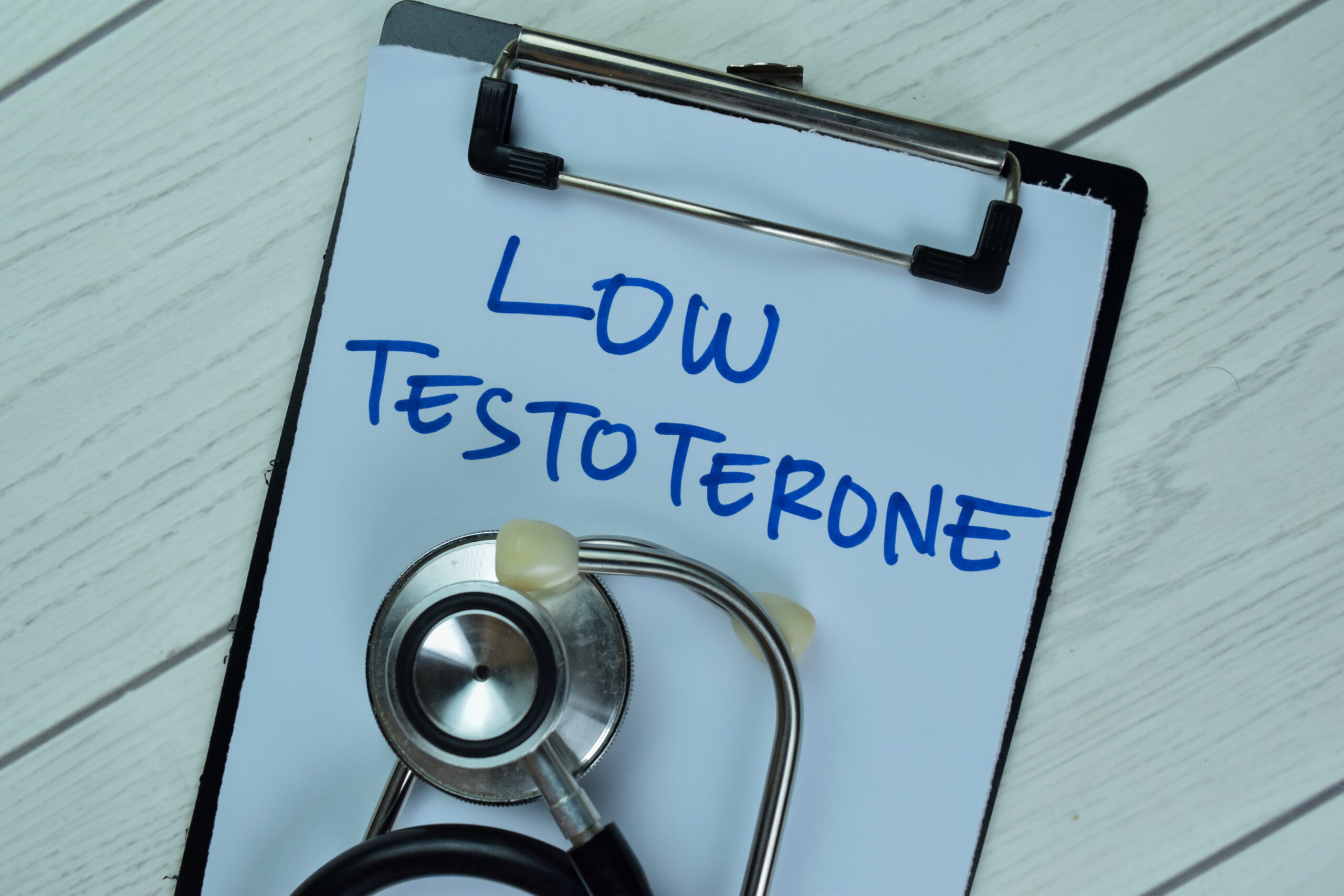Unlock Your True Potential: Experience the Surge of Virility with Our All-Natural Male Enhancement Tea. Click Here to Embark on Your Journey to Enhanced Performance!
Introduction:
Imagine waking up feeling tired and sluggish, a stark contrast to the energetic mornings of your youth. You might notice a decline in muscle mass, a persistent lack of motivation, and a dwindling sex drive. These symptoms, often attributed to the natural aging process, could point towards a more significant underlying issue: testosterone deficiency.
Testosterone, the primary male sex hormone, plays a vital role in a man’s physical and mental well-being. It’s responsible for muscle development, bone density, energy levels, sex drive, and even mood regulation. When testosterone levels decline, it can significantly impact your quality of life and overall health.
Understanding Testosterone and Its Functions:
Testosterone production naturally declines with age, starting in a man’s late 20s or early 30s. However, certain factors can accelerate this decline, leading to testosterone deficiency before it typically occurs. Here’s a closer look at testosterone’s various functions:
- Muscle Building and Strength: Testosterone promotes muscle growth and repair, contributing to your overall physical strength and stamina.
- Bone Health: Adequate testosterone levels are essential for maintaining strong bones and preventing osteoporosis.
- Sex Drive and Libido: Testosterone plays a crucial role in sexual desire and function.
- Sperm Production: Testosterone helps stimulate sperm production, contributing to male fertility.
- Red Blood Cell Production: Testosterone supports the production of red blood cells, which are responsible for carrying oxygen throughout the body.
- Mood and Energy Levels: Testosterone can influence mood regulation and energy levels.
Recognizing the Signs of Testosterone Deficiency:
While some men experience a gradual decline in testosterone, others face a more rapid drop, leading to a set of noticeable symptoms. If you experience several of the following, it’s crucial to consult a healthcare professional for a proper diagnosis:
- Decreased Sex Drive: A significant and persistent drop in sexual desire can be a telltale sign of testosterone deficiency.
- Erectile Dysfunction (ED): Difficulty achieving or maintaining an erection is a common symptom of low testosterone.
- Reduced Energy Levels: Feeling uncharacteristically tired and sluggish throughout the day can be indicative of a hormonal imbalance.
- Loss of Muscle Mass and Strength: Men with testosterone deficiency often experience a decrease in muscle mass and a decline in physical strength.
- Increased Body Fat: Testosterone helps regulate metabolism and fat storage. Low testosterone can lead to weight gain, particularly around the belly.
- Low Mood and Irritability: Testosterone fluctuations can contribute to mood swings, including increased irritability and low mood.
- Difficulty Concentrating: Declining testosterone levels may affect cognitive function, leading to difficulty concentrating and remembering things.
- Sleep Problems: Sleep disturbances and insomnia are common complaints among men with testosterone deficiency.
- Loss of Body Hair and Decreased Bone Density: These changes occur more gradually but can be a sign of a long-term testosterone deficiency.
Unlock Your True Potential: Experience the Surge of Virility with Our All-Natural Male Enhancement Tea. Click Here to Embark on Your Journey to Enhanced Performance!
Understanding the Causes of Testosterone Deficiency:
Several factors can contribute to low testosterone levels in men. Here are some of the most common causes:
- Age: As mentioned earlier, testosterone production naturally declines with age.
- Medical Conditions: Certain medical conditions like hypogonadism (impaired function of the testicles), obesity, and diabetes can affect testosterone production.
- Genetics: Some men are genetically predisposed to lower testosterone levels.
- Medications: Certain medications, such as corticosteroids and chemotherapy drugs, can decrease testosterone production as a side effect.
- Lifestyle Habits: Poor diet, lack of exercise, chronic stress, and excessive alcohol consumption can all contribute to low testosterone.
- Environmental Toxins: Exposure to environmental toxins like pesticides and heavy metals may potentially impact testosterone levels.
Exploring Treatment Options for Testosterone Deficiency:
If a healthcare professional confirms testosterone deficiency through a blood test, various treatment options are available. The best approach will depend on your individual circumstances and overall health. Here are some common treatment methods:
- Testosterone Replacement Therapy (TRT): This involves administering testosterone through various methods like injections, gels, patches, or pellets. TRT is an effective treatment for restoring testosterone levels and alleviating symptoms. However, it’s crucial to discuss the potential benefits and risks with your doctor.
- Lifestyle Modifications: Making healthy lifestyle changes can significantly improve testosterone levels. This includes adopting a balanced diet, regular exercise, managing stress levels, and getting adequate sleep.
- Treating Underlying Conditions: If an underlying medical condition is contributing to low testosterone, addressing it can help restore hormonal balance.
Conclusion:
Testosterone deficiency is a common condition that can significantly impact your physical and mental well-being. Recognizing the signs and taking proactive steps are crucial for regaining control of your health and reclaiming your vitality. By consulting a healthcare professional, you can explore potential causes, discuss personalized treatment options, and restore hormonal balance.
Disclaimer :This article is for informational purposes only and does not constitute medical advice. Please consult with a qualified healthcare professional before making any changes to your diet, exercise routine, or taking any supplements or medications. Self-treating can be dangerous, and therefore, consulting a healthcare professional is always the best course of action when addressing any health concerns or considering changes to your well-being.
Sources:
- “Testosterone Deficiency” by the National Institute of Diabetes and Digestive and Kidney Diseases (https://www.ncbi.nlm.nih.gov/pmc/articles/PMC4674408/)
- “Low Testosterone (Low T)” by the Mayo Clinic (https://newsnetwork.mayoclinic.org/discussion/mayo-clinic-minute-how-low-testosterone-can-affect-mens-health/)
- “Testosterone Deficiency: Causes, Symptoms, and Treatment” by the American Urological Association (https://www.auanet.org/documents/Guidelines/PDF/Testosterone-Deficiency-JU.pdf)
- “Testosterone Deficiency: A Comprehensive Review” by the Journal of Clinical Endocrinology & Metabolism (https://www.ncbi.nlm.nih.gov/pmc/articles/PMC4674408/)
- “The Role of Testosterone in Men’s Health” by the Hormone Health Network (https://www.endocrine.org/patient-engagement/endocrine-library/hypogonadism)
testosterone deficiency, testosterone levels, low testosterone, symptoms, causes, treatment, testosterone replacement therapy, lifestyle changes, men’s health, sexual health, hormonal balance, wellness, healthy lifestyle #testosteronedeficiency #lowtestosterone #testosteronereplacementtherapy #menshealth #sexualhealth #hormonalbalance #wellness #healthylifestyle


